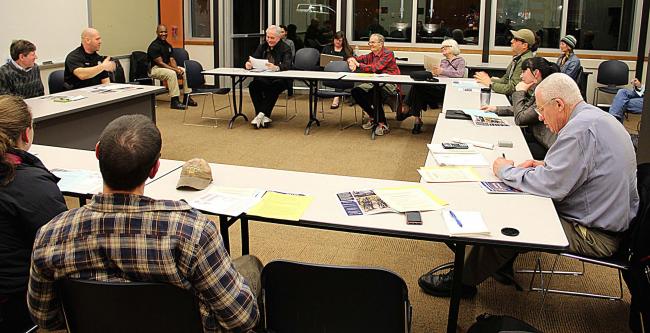Want to wear a badge? Seattle looking for new cops
The West Seattle Crime Prevention Council meeting focused on new hiring for the Seattle Police and recent crime trends.
Thu, 03/20/2014
By Gwen Davis
Detective Kevin Nelson, an officer with the Seattle Police Department (SPD), knew since he was nine-years-old that he wanted to be a cop.
However, before this decision, Nelson never considered this career path at all.
It was on one fateful day, when Nelson was in elementary school, a couple African American police officers took Nelson and a couple of his friends, who were also African American, out of the classroom for a day, to tell them what being a police officer was all about.
Nelson was mesmerized.
“I was like, ‘that’s an option?’” Nelson said at the West Seattle Crime Prevention Council meeting last Tues. “From that point on, I knew I wanted to be a police officer.”
Cops needed
The meeting, which attracted about 20 people, mainly focused on recruiting new cops.
The SPD is looking to hire 85 new people.
With the recovering economy, many cops are retiring. The SPD urgently needs to fill those vacancies.
It takes a year and a half to become a police officer. Candidates need to go through an academy, training and lots of testing.
“Not everyone can do this job and not everyone will do this job,” said Officer Andre Sinn, the primary speaker for the recruitment pitch.
Lt. Ron Smith said police officers span all backgrounds, career orientations and lifestyles. Some have college degrees and some don’t. Some are young, some are older. The only prerequisite is to have passed high school, and be 20.5 years old.
“Some of our best officers are ex-teachers,” Smith said. “They have writing skills and know how to control people.”
The SPD is trying to hire more minority candidates.
Furthermore, “it wasn’t too long ago that the department was male-dominated,” Smith said. Now a large percentage is female.
Entry-level testing dates are coming up soon: July 12 and Oct. 4, so now is the time to apply.
The cop life
Statistically, only a fraction of the people who apply make it. In the past, 200 people applied and only 15 became cops. The combination of background checks, physical testing, driving records, psychological testing and polygraph tests, weed out candidates.
For every one candidate the SPD hires, 20 have gone through the application process.
New cops are placed where they are most needed. They are also given the most-needed shifts.
Pay is high for SPD cops. Sworn officers make anywhere from $69,240 to $90,672 annually.
One participant asked if he would have to give up his friends who drink or smoke, to became a cop.
“Definitely keep those friends you make outside of law enforcement,” Sinn said. “It keeps your sanity.”
When hiring, SPD can’t check people’s Facebook pages, and other “can’ts” to respect people’s privacy.
Applications are filled online.
Recent crime trends
The meeting also disclosed recent crime trends.
Burglaries, which average nine per month, are now down to six.
Smith said that utilizing task force officers, the department of correction officers and narcotics officers made the burglary rate “look very positive”.
Auto theft is down to five, which usually averages eight.
Non-residential burglary usually averages two, but is down to one.
With domestic violence, two cases were reported, which is typical.
But Smith said he wished domestic violence reports would be on the higher end, since that is one area people are intimidated, and are hesitant to call the police.
Smith told attendees car prowl crimes were down to three this month, over the usual nine, which is “a significant reduction,” he said.
Other concerns
One participant noticed the bathrooms in Roxhill Park were unlocked at 11 p.m. “The bathrooms always seem unlocked,” which made her nervous, she said.
Another participant talked about the stairways late at night, especially the one traveling from Fauntleroy to California. “I often wonder, since we had some issues [in the, can a police officer flash a light [on the stairway at night?”
Another attendee said she was walking along a major street in W. Seattle and saw a group of four men, sitting on the sidewalk. She said they seemed like they were drinking.
However, if people don’t break the law, police cannot do anything about these types of occurrences.
“If they are legally acting, there’s nothing much we can do,” Smith said. “We can displace them but can’t get rid of them.”
Displacement creates problems since what it essentially does it move people from one area of town to another. It doesn’t make the situation better.
Smith said that police can make social contacts with disorderly people, but can’t threaten them with jail.
The president of the council, Richard Miller, said simply to “be careful about those dead ends.”
“You pay us when calling 911, so don’t hesitate to call us,” Smith added.
However, there is a priority list, and people might have to wait before receiving low-priority attention.


